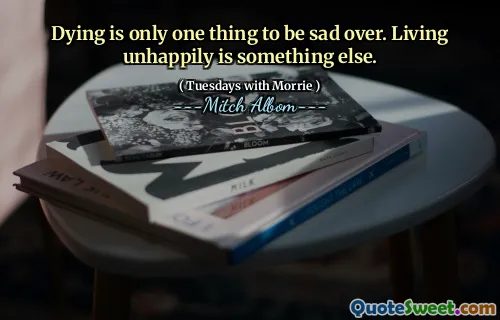
You'll come to my grave? To tell me your problems?My problems?Yes.'And you'll give me answers?I'll give you what I can. Don't I always?I picture his grave, on the hill, overlooking the pond, some little nine foot piece of earth where they will place him, cover him with dirt, put a stone on top. Maybe in a few weeks? Maybe in a few days? I see myself sitting there alone, arms across my knees, staring into space.It won't be the same, I say, not being able to hear you talk.Ah, talk . . . He closes his eyes and smiles.Tell you what. After I'm dead, you talk. And I'll listen.
In the conversation between the narrator and Morrie, there is a poignant reflection on death and the nature of their relationship. Morrie acknowledges the inevitability of death and assures the narrator that even after he's gone, he will still be there in spirit, ready to listen. This builds a sense of comfort amid the sadness of loss, emphasizing that communication can transcend physical boundaries.
The narrator imagines visiting Morrie's grave, experiencing a profound sense of loneliness at the thought of not being able to hear Morrie's voice. Yet, Morrie's response suggests a deeper understanding of connection; although he won't be physically present, the emotional bond and wisdom shared through conversations will remain. This exchange highlights the lasting impact of relationships and the power of dialogue, even in the face of mortality.











